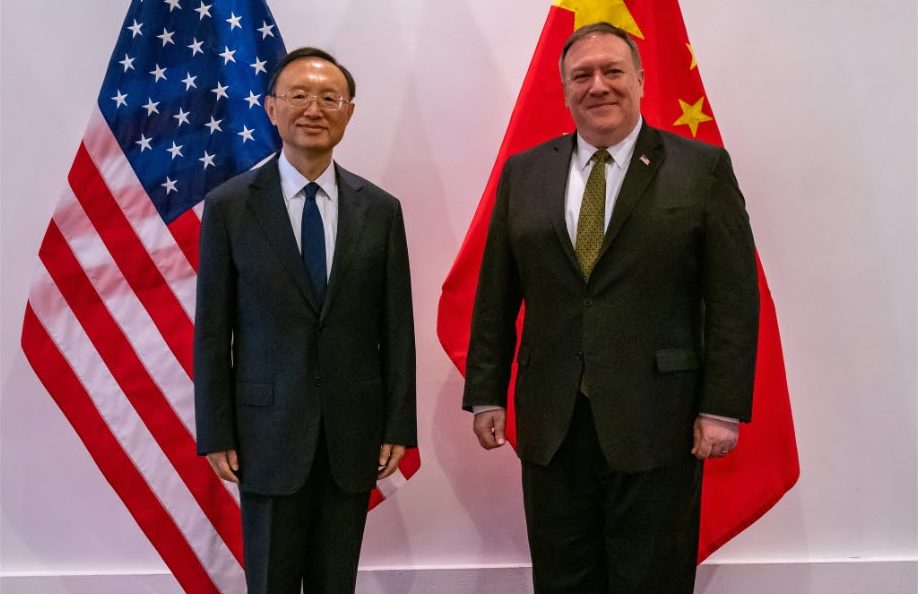Pompeo warns Chinese counterpart of ‘more confrontation to come’
U.S. Secretary of State Mike Pompeo and his most direct Chinese counterpart, Yáng Jiéchí 杨洁篪 — who holds two equally important titles, Politburo member, and director of the Office of Foreign Affairs of the Communist Party of China — met yesterday in Hawaii. It was the first high-level diplomatic meeting between the U.S. and China in months, but don’t mistake that for a sign of détente.

“No consensus was reached in talks between China’s top diplomat Yang Jiechi and U.S. Secretary of State Mike Pompeo on Wednesday, but the two had dinner and spoke for seven hours in what observers said showed a willingness to maintain dialogue and keep their relations at least at the current level,” the South China Morning Post summarizes.
Ahead of the meeting, the two sides could not agree on who had even requested the meeting, according to Wall Street Journal reporter Chun Han Wong.
The meeting readouts do not have much in common:
- A Chinese Foreign Ministry statement (Chinese, English) says that Yang Jiechi urged cooperation rather than confrontation, but then says, in detail, how Yang confronted Pompeo with Beijing’s hardline views on Taiwan, Hong Kong, and Xinjiang.
- A much shorter State Department readout, which identified Yang only by his Politburo membership, merely says that the two met to “exchange views,” and that the U.S. pushed for “fully reciprocal dealings between the two nations across commercial, security, and diplomatic interactions.” No mention was made of any particular issue, other than “the need for full transparency and information sharing to combat the ongoing COVID-19 pandemic.”
The meeting had no effect on the implementation of Hong Kong- and Xinjiang-related legislation that was already lined up, Reuters points out:
Hours after the meeting ended, China announced that its top parliamentary body will review draft Hong Kong national security legislation during a session that began on Thursday…
As the meeting got under way, U.S. President Donald Trump signed legislation calling for sanctions against those responsible for repression of Uyghur Muslims in China’s Xinjiang region, prompting a threat of retaliation from Beijing.
Beijing fiercely pushed back to Trump’s signing of the Uyghur Human Rights Policy Act, per the Global Times:
Four government agencies, including the Chinese Foreign Ministry, the foreign affairs committees of the National People’s Congress (NPC) and the Chinese People’s Political Consultative Conference (CPPCC) National Committee as well as Xinjiang regional legislature released statements condemning the U.S. move.
To get a taste of how fierce those statements were, see this (in Chinese) from the Communist Party Standing Committee in Xinjiang. The nearly 3,000-character screed about the hypocrisy of U.S. promotion of human rights ends with this:
We once again reiterate that the Xinjiang issue is not about human rights, ethnicity or religion at all, but about combating violence, terrorism and separatism…The slander and unjustifiable sanctions by the US are totally against the 25 million people of Xinjiang, the 1.4 billion Chinese people and the morality and conscience of mankind. They are a disgusting trick played by U.S. politicians. The so-called “Uyghur Human Rights Policy Bill 2020” is just a piece of paper and will be swept into the garbage by the forces of justice!
As the New York Times notes, the members of the Communist Party Standing Committee in Xinjiang “would presumably be among those targeted by the administration for punishment under the bill Mr. Trump signed.”
Pompeo’s goal in the meeting with Yang, according to an anonymous American official cited in the New York Times, was “not to seek a de-escalation of tensions. Rather, said the person, it served as a warning of more confrontation to come as the United States election campaign ramps up and the country copes with the fallout of the pandemic.”






